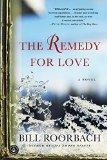Summary | Excerpt | Reading Guide | Reviews | Beyond the Book | Readalikes | Genres & Themes | Author Bio

The girl druid ahead of him in line wasn't saying it, but she didn't have enough money. The old gent had packed everything and placed her six or seven bags of stuff into her cart. She counted out her fives and ones and piles of quarters again. "I thought I had it all added up," she said humbly.
"People are waiting," the checkout lady said.
"I'm fine," Eric said brightly.
The lady behind him made it plural, pleasant voice: "We're fine." Back after that, the line was nothing but patience.
"I'll have to put the coffee back," the young woman said.
The old gent knew right where the coffee was and dug it out along with the filters, and the checkout lady subtracted them from the register total, apparently a vexing task. Now the young woman's bill was down to fifty-five dollars and change. She should have gone generic with the Advil, Eric thought. That would have saved her five bucks or more.
"I'll run 'em back after," the bagger said, meaning the coffee and the filters. He seemed sadder than ever, and Eric pictured the sweet old fellow using half his break to transport the items back to the correct shelf in some distant corner of the vast store.
"It's been ground," the checkout lady said. "You'll have to keep it."
"Then the oranges," the young woman said. "And the carrots."
She didn't know but Eric and everyone watching the little drama knew that the oranges and the carrots weren't going to be enough. He found himself rooting against the Advil: keep the fruit, keep the carrots! That big bottle was probably eleven dollars.
The checkout lady puffed a long breath. But the old gent in the apron said, "No, no, you need your nutrition. I'll chip in here, honey."
"I couldn't," said the young woman.
"Let's just take the oranges out, Frank," said the checkout lady, already tapping the buttons on her register.
But Frank dug in his pockets. "Ach," he said. He showed the girl, he showed the checkout lady, he showed everyone in line: he only had a dollar and some odd change. Time stood still. Even the motes of dust stopped floating in the fluorescent box-store light. Eric felt something rumbling inside him, rumbling up all the way from his toes, something that gained momentum, something urging him to act, something physical, not articulate at all, something you would have to capitalize if you wrote it down on a yellow legal pad, something you could name a statue atop a fountain in the Vatican, not quite Grace. Charity, perhaps. His hands twitched, his mouth shaped words that wouldn't come. Finally, just as the girl was going to say something about the Advil, he got it out:
"I'll get this. Frank, ma'am, young lady, let me get this."
But Frank had already put his buck-fifty down.
"No," said the young woman. "No, please."
Eric added a crisp cash-machine twenty to her pile of wrinkled bills and simple as that, the checkout lady re-added the ticket, gave Eric the change for his twenty, gave Frank back his dollar fifty.
The young woman regarded Eric briefly, coldly, more or less curtsied in that sleeping bag of a coat, flushed further. That was it for thanks. She ducked her head back into the depths of her hood and just pushed her cart out of there, noticeably limping, her very posture humiliated.
"If these people would just learn to add," the checkout lady said. One was supposed to know what "these people" meant.
Eric's purchases were already piled in front of old Frank. Eric paid the cashier, more than double the girl's total, and for nothing but a single evening's desperate hospitality. Frank, he noted, liked him, cheerfully putting Eric's stuff in paper bags, two guys who cared about not only indigent young women but about the whole wide world. The checkout lady had no use for them at all, none of them.
Excerpted from The Remedy for Love by Bill Roorbach. Copyright © 2014 by Bill Roorbach. Excerpted by permission of Algonquin Books. All rights reserved. No part of this excerpt may be reproduced or reprinted without permission in writing from the publisher.
Your guide toexceptional books
BookBrowse seeks out and recommends the best in contemporary fiction and nonfiction—books that not only engage and entertain but also deepen our understanding of ourselves and the world around us.